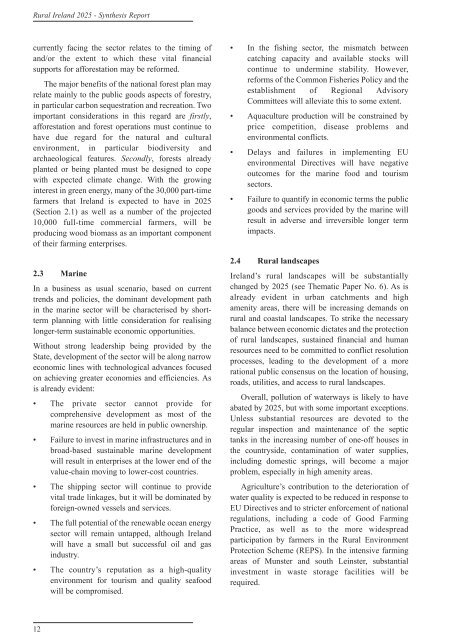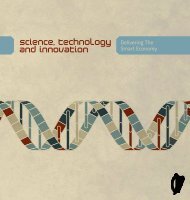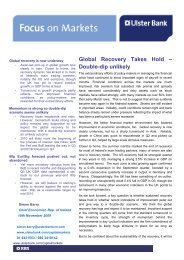RURAL IRELAND 2025 Foresight Perspectives - Coford
RURAL IRELAND 2025 Foresight Perspectives - Coford
RURAL IRELAND 2025 Foresight Perspectives - Coford
- No tags were found...
You also want an ePaper? Increase the reach of your titles
YUMPU automatically turns print PDFs into web optimized ePapers that Google loves.
Rural Ireland <strong>2025</strong> - Synthesis Reportcurrently facing the sector relates to the timing ofand/or the extent to which these vital financialsupports for afforestation may be reformed.The major benefits of the national forest plan mayrelate mainly to the public goods aspects of forestry,in particular carbon sequestration and recreation. Twoimportant considerations in this regard are firstly,afforestation and forest operations must continue tohave due regard for the natural and culturalenvironment, in particular biodiversity andarchaeological features. Secondly, forests alreadyplanted or being planted must be designed to copewith expected climate change. With the growinginterest in green energy, many of the 30,000 part-timefarmers that Ireland is expected to have in <strong>2025</strong>(Section 2.1) as well as a number of the projected10,000 full-time commercial farmers, will beproducing wood biomass as an important componentof their farming enterprises.2.3 MarineIn a business as usual scenario, based on currenttrends and policies, the dominant development pathin the marine sector will be characterised by shorttermplanning with little consideration for realisinglonger-term sustainable economic opportunities.Without strong leadership being provided by theState, development of the sector will be along narroweconomic lines with technological advances focusedon achieving greater economies and efficiencies. Asis already evident:• The private sector cannot provide forcomprehensive development as most of themarine resources are held in public ownership.• Failure to invest in marine infrastructures and inbroad-based sustainable marine developmentwill result in enterprises at the lower end of thevalue-chain moving to lower-cost countries.• The shipping sector will continue to providevital trade linkages, but it will be dominated byforeign-owned vessels and services.• The full potential of the renewable ocean energysector will remain untapped, although Irelandwill have a small but successful oil and gasindustry.• The country’s reputation as a high-qualityenvironment for tourism and quality seafoodwill be compromised.• In the fishing sector, the mismatch betweencatching capacity and available stocks willcontinue to undermine stability. However,reforms of the Common Fisheries Policy and theestablishment of Regional AdvisoryCommittees will alleviate this to some extent.• Aquaculture production will be constrained byprice competition, disease problems andenvironmental conflicts.• Delays and failures in implementing EUenvironmental Directives will have negativeoutcomes for the marine food and tourismsectors.• Failure to quantify in economic terms the publicgoods and services provided by the marine willresult in adverse and irreversible longer termimpacts.2.4 Rural landscapesIreland’s rural landscapes will be substantiallychanged by <strong>2025</strong> (see Thematic Paper No. 6). As isalready evident in urban catchments and highamenity areas, there will be increasing demands onrural and coastal landscapes. To strike the necessarybalance between economic dictates and the protectionof rural landscapes, sustained financial and humanresources need to be committed to conflict resolutionprocesses, leading to the development of a morerational public consensus on the location of housing,roads, utilities, and access to rural landscapes.Overall, pollution of waterways is likely to haveabated by <strong>2025</strong>, but with some important exceptions.Unless substantial resources are devoted to theregular inspection and maintenance of the septictanks in the increasing number of one-off houses inthe countryside, contamination of water supplies,including domestic springs, will become a majorproblem, especially in high amenity areas.Agriculture’s contribution to the deterioration ofwater quality is expected to be reduced in response toEU Directives and to stricter enforcement of nationalregulations, including a code of Good FarmingPractice, as well as to the more widespreadparticipation by farmers in the Rural EnvironmentProtection Scheme (REPS). In the intensive farmingareas of Munster and south Leinster, substantialinvestment in waste storage facilities will berequired.12








